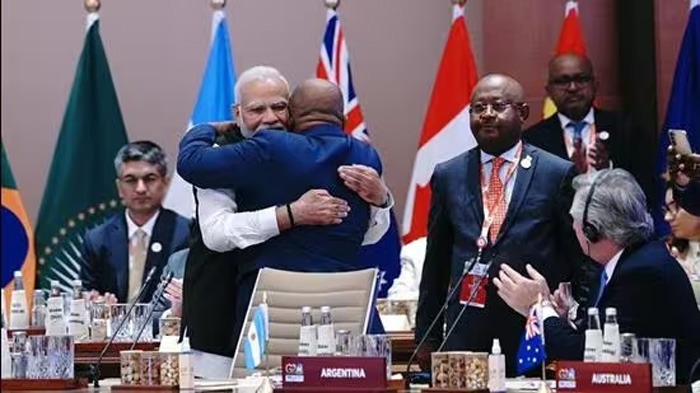The African Union became a permanent member of the G20 on Saturday as leaders of the world’s largest economies gathered in New Delhi for a summit that will focus on pressing global challenges under the shadow of the Ukraine crisis.
In a brief televised inaugural session, Prime Minister Narendra Modi announced the move to make the 55-member African bloc the first new member of the G20 since its creation in 1999 to cope with a series of financial crises.
“In keeping with the sentiment of sabka saath (with everyone), India had proposed that the African Union should be given permanent membership of the G20. I believe we all are in agreement on this proposal,” Modi said, speaking in Hindi.
After saying “with your agreement”, Modi banged a gavel thrice to mark the entry of the African Union into the grouping. “Before we start our work, I invite the African Union president to take his position as a permanent member,” he said.
External affairs minister S Jaishankar escorted the current chairperson of the African Union, Comoros President Azali Assoumani, to his seat at the table. Modi greeted Assoumani with a hug before the G20 leaders began their deliberations behind closed doors.
The admission of the African Union, which was launched in 2002, has been included in the draft leaders’ declaration currently being negotiated by the G20 states, people familiar with the matter said. The African Union is expected to have the same status as the 27-member European Union (EU), the only regional bloc with full membership of the G20.
Diplomats of G20 member states had said the African Union’s inclusion is not expected to lead to a change in the name of the G20.
In June, Modi had written to counterparts among G20 members that the African Union should be given full membership of the grouping. The proposal was also backed by key members of the EU, China and Russia, albeit for different reasons.
Besides the EU, key members of the G7, such as Japan backed the move to give African countries, which are part of the Global South, a greater say in the global governance architecture. China was reluctant to be seen as going against the move in view of its large investments in Africa through the Belt and Road Initiative, while Russia has been keen to woo over more African states to counter its isolation by the West over the Ukraine conflict.
While negotiations on a draft leaders’ declaration continue to be bedevilled over the text to refer to the Ukraine crisis, India is looking to produce results in areas where it has led signature initiatives, such as financing for climate transition, digital public infrastructure, accelerated implementation of the sustainable development goals (SDGs), and reform of global institutions and multilateral development banks.
India has also positioned itself as the “voice of the Global South” during its G20 presidency, and the push to get the African Union into the bloc of the world’s wealthiest economies was part of these efforts.


Comments are closed.